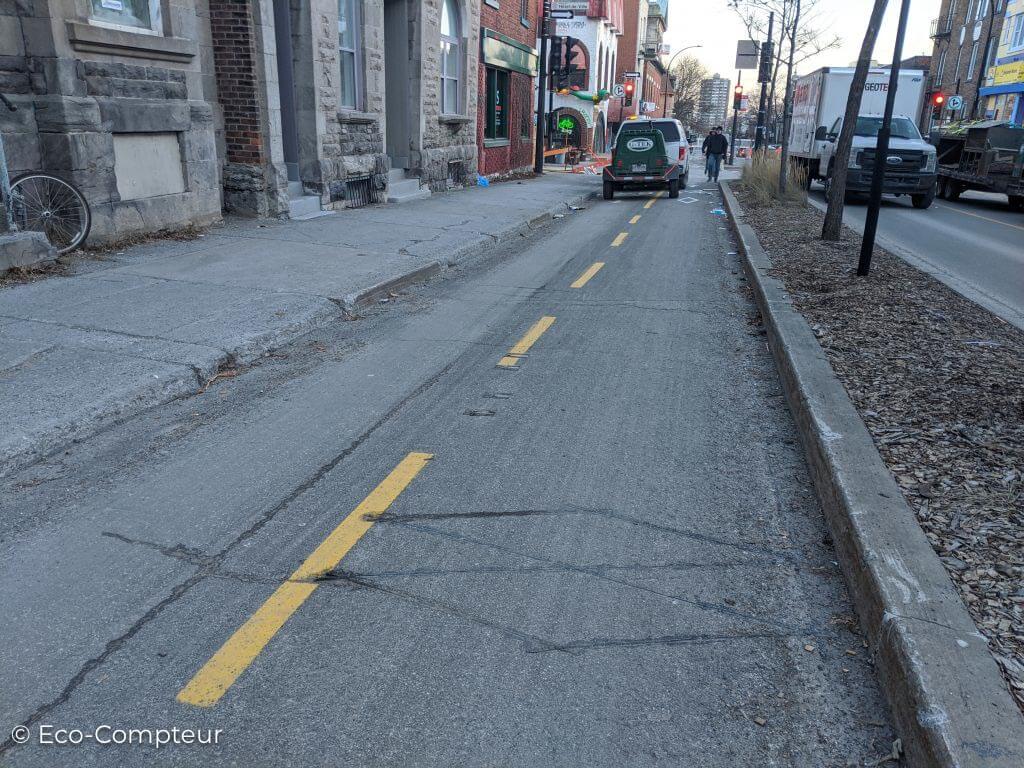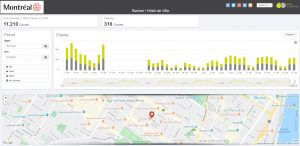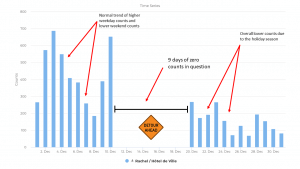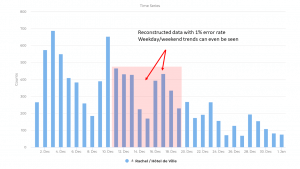A few months ago, I had to take a detour on my bike commute to work at the Eco-Counter office in Montreal.
On my usual route, a three block section of the bidirectional bike lane on Rachel Street – a principle East-West Axis near our office – was closed for construction. At this point, with construction trucks and machinery in the bike lane, cyclists were being diverted onto an adjacent street.

Detour around the counter
That section of the bidirectional bike lane just so happens to have a ZELT permanent bike counter. While the counter itself remained intact and fully-functioning, because cyclists were diverted away from the counting site, the counter recorded zero/blank daily counts for the duration of the 9-day closure. December 2019 was a bit warmer than usual, and the Borough has been really fantastic about snowclearing the bike lanes lately, so we would expect about 400 counts per weekday during that time and around ~200/day on a Saturday and a Sunday.

You can see the gap in the data on the City of Montreal’s Public Web Page for that particular ZELT counter and also on their Public Web Page +, which overviews all of the bike counters across the city.

This sort of deviation from the average daily count is the kind of thing our Eco-Alert system is designed for. With Eco-Alerts, if you have automatic data transimission, an email is automatically sent to you if your counts don’t quite look normal. A 9-day long period of zero counts can have a significant impact on aggregated figures like weekly and monthly averages. With missing count data, daily, weekly, monthly and year-on-year comparisons can be unreliable. The foundation of good data analysis is healthy, accurate and reliable data.

Our new data reconstruction service can fix that
That’s where our new data reconstruction service from our data service team comes in! Developed in collaboration with McGill University, our data reconstruction tool is able to reconstruct data gaps within a 5% margin of error.
We use well-tested techniques to ensure that data anomalies are detected and that reconstructions minimize error. A best practice is to reconstruct count data based on reference counter factor groups; however, some counting locations may not have references in close proximity. We use a seven-step process – a methodology published in a peer-reviewed journal – to validate and reconstruct data when reference sites exist. Here’s how:
- Calculate the daily/hourly factors for each long-term counting location
- Calculate the correlation between all possible pairs of reference sites
- Select similar counting sites
- Compute the ratio of daily/hourly factors
- Set threshold and flag days in need of reconstruction
- Develop reconstruction model and reconstruct flagged days
- Estimate model error
Reconstructing data to allow for accurate trend analysis
In the case of the Rachel bike path closure, there are two other ZELT counters – one on Saint Urbain street and one on Parc Avenue – within close proximity of the affected counter that we can use as reference counters. When looking at the counter’s data in Eco-Visio 5, you would see a daily average bike count of 200 for the month of December and a total of 6,226 bike passes. That’s a 29% decrease compared to 2018. Visually, it doesn’t look so good either:

After reconstruction, however, the story is a bit different. Things look back to normal. The December daily average bike counts are 301 per day, giving a total of 9343 bikes counted during the month – a 6% increase over 2018. The graph looks better too:

Every now and again, missing count data happens. Whether it’s construction in the bike lane, flooding, snow plowed-in PYRO-Boxes, or the classic dead battery – we’ve seen it all. Our team of data service experts developed this tool to address these problems and provide a service that ensures you have the the most accurate data possible.
Get in touch with our data services team to learn more about data reconstruction and the wide-variety of custom services we offer to help you go further with your data.






There is no comments